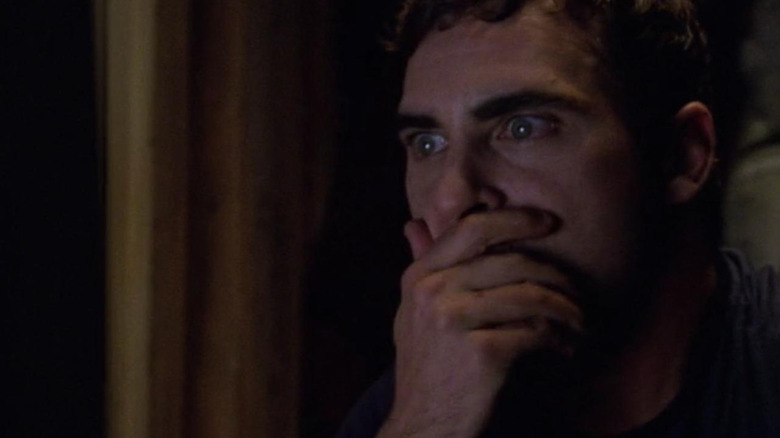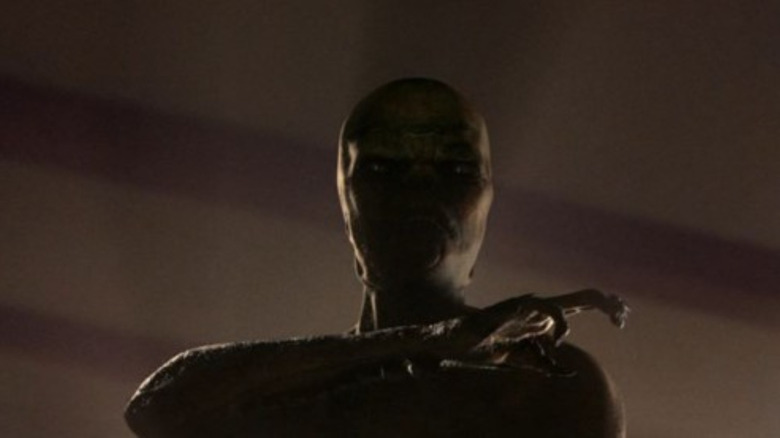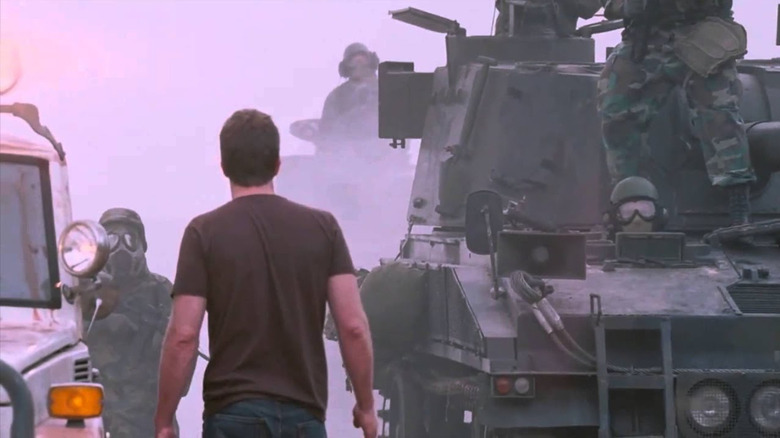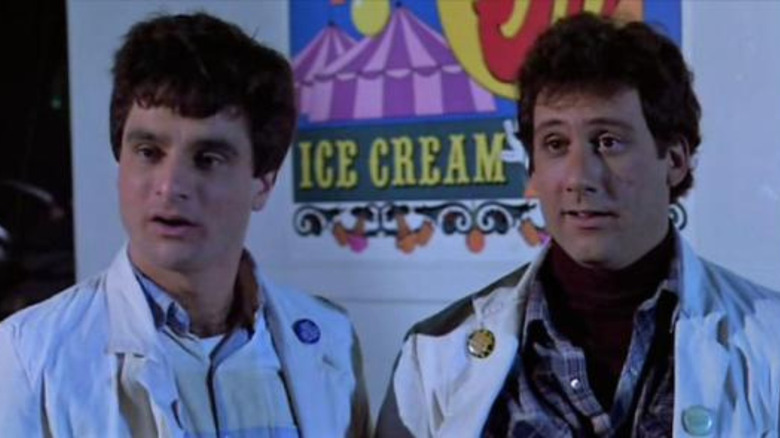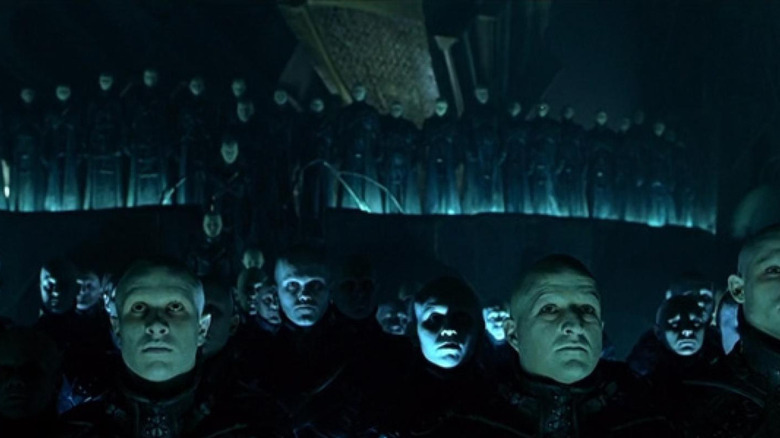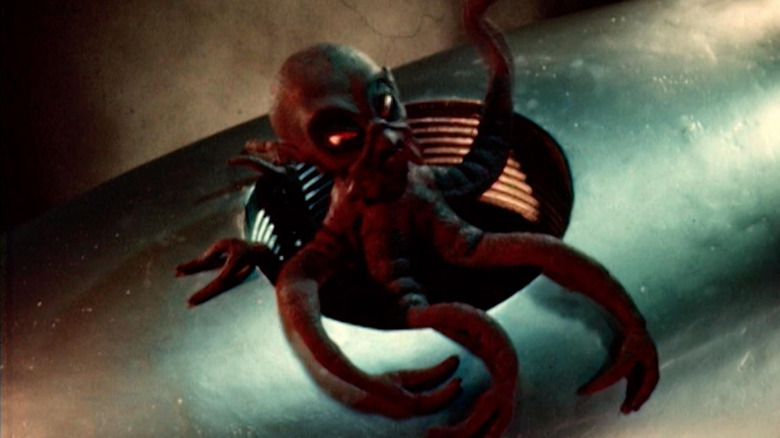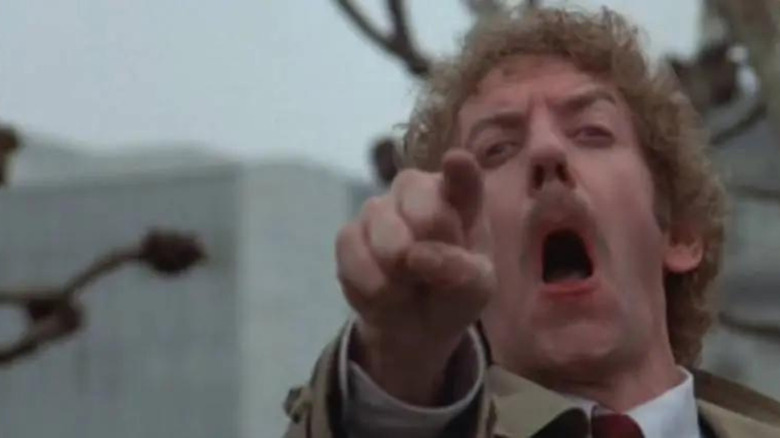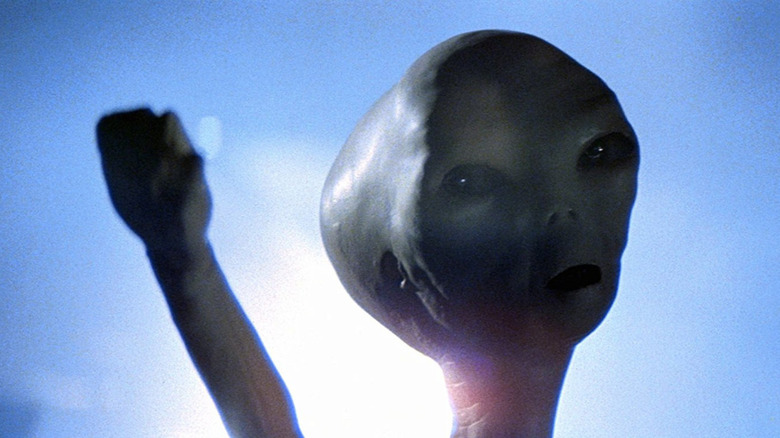7 Alien Invasion Movies With A Surprising Twist
Be afraid, be very afraid! Alien invasions in film might be on the verge of a comeback thanks to the upcoming sci-fi horror "Nope," and we are all for it. Besides, alien invasion movies have a surprisingly long history with the art form, being chock-full of real-world metaphors that often continue to be timely in the current age.
Of course, a lot more is going on in these movies than just an impending visit from otherworldly beings and sociopolitical imagery. For the movie to still be compelling, the aliens usually have another motive or even a weakness that allows the human characters to at least stand a chance against them. These are usually presented to the audience as twists, something that really changes the game for our protagonists, either giving them one last chance at saving humanity or dooming them for good.
However, some twists stand out among the rest. Whether it's for a philosophical reason or just because it's completely implausible, I adore these alien invasion twists and hope they are just as enjoyable to you.
Signs: The aliens are allergic to water
Come on, did you really think this movie wouldn't be included? Even though the twist in "Signs" is pretty divisive, you can't deny that it sticks with you and might have even influenced your own alien-preparation tactics. I won't confirm or deny whether it has for me.
Going back to the topic at hand, things look extremely dire for the Hess family as extraterrestrials descend upon their farm and the world at large. The head of the house, former priest Graham (Mel Gibson), is ensuring that his two young kids and his brother Merrill (Joaquin Phoenix) are able to survive the night. However, they are granted momentary relief when it is revealed via the radio that the invading aliens' major weakness is water. When a straggling creature attacks the home, Graham regains his faith when Merrill kills it with water and his asthmatic son Morgan (Rory Culkin) survives a toxic gas spray because of his constricted lungs. Sure, the water twist is a bit strange and gets flimsier the more you think about it, but you can't say you expected it to happen upon first watch.
The Mist: Everyone could have been saved
Can you tell I'm trying to get the more obvious additions to this list out of the way first? Jokes aside, the ending of "The Mist" is perhaps one of the most iconic in terms of how shocking and out of left field it is. At the same time, however, it's hard to argue it wasn't necessary for the overall experience of the film, as its bleakness recontextualizes everything the viewer has seen up to that point.
Having experienced devastating losses at the hands of the mysterious alien creatures engulfing his town, David (Thomas Jane) simply sees no other way out than death. He shoots and kills four of the people that have joined him in their escape, including his young son Billy (Nathan Gamble), right before the U.S. Army kills the remaining creatures and rescues him. It's a hell of a cruel gut punch to witness, and it certainly doesn't help that Jane gives the best and most emotionally charged performance of his career in those final few minutes.
Killer Klowns From Outer Space: How are the Terenzis still alive?
So here's some much-needed levity from that previous entry. While not nearly as serious as some of the other movies on the list, the survival of two particular characters in "Killer Klowns From Outer Space" is absolutely absurd. This is saying a lot considering the movie we're talking about here is, you know, "Killer Klowns From Outer Space." But seriously, Rich (Michael S. Siegel) and Paul Terenzi (Peter Licassi) should not have been even close to alive at the end of the movie.
Let me explain. Upon sneaking onto the tent-like ship of the titular Klowns, the Terenzis get separated from their friend Mike (Grant Cramer) and local cop Dave (John Allen Nelson), bumping into some lady Klowns with ... certain features along the way. They reappear near the end of the film driving their ice cream truck and looking extremely disheveled. As a last-ditch effort to distract Jojo the Klownzilla, the duo blares their truck's sound system before the entire vehicle gets destroyed by the marionette ruler. However, they somehow survived the explosions of both the truck and the Klown spaceship because they hid in a freezer. If that isn't a plot twist, I don't know what is!
Dark City: They were aliens the entire time
"Dark City" is bonkers in all the right ways. Case in point, the bizarre and genuinely unexpected twist that happens around halfway through, wherein the viewer finds out about the true intentions of the nefarious group known as the Strangers. Sure, the twist itself is that the Strangers are aliens experimenting with humans en masse. However, it still counts as a damn good twist considering that little seemed to suggest everything was taking place on an alien spaceship.
So yeah, here's the thing. In an effort to understand humans better, and to inevitably wage war against the species, aliens have been abducting Earthlings and placing them in realistic simulations, using the corpses of those who have died as their hosts. Think of it as a reverse invasion, in a way, which means it still counts for this list. When the truth is discovered by the amnesiac Murdoch (Rufus Sewell), it ultimately becomes up to him to escape their complex world and regain his sense of sense.
War of the Worlds: The aliens' invasion was doomed
For anyone who has read H.G. Wells' original novel or has engaged with its many adaptations, this might not be a major twist. However, given the colonialist overtones of the core message, it's hard not to feel some sort of emotional impact at the ultimate alien revelation. In both the films that adapted the novel, it is revealed that the invading aliens were only able to last a couple of days before dying out. It turns out that the aliens were never biologically equipped to sustain life on Earth due to the atmosphere's pathogens, dooming themselves and humanity in the process.
This begs the question: What even was the point of the invasion in the first place? Who's to really say? The original material's inspiration by the devastating Tasmanian colonization at the hands of the British has never been lost in translation. The final declarations in both the 1953 and 2005 movies were far from celebratory, and both races involved in the Earthly invasion have been all but eradicated. It's a bittersweet and even existential twist that still packs a punch today.
Both Invasion of the Body Snatchers films: Our total replacement is inevitable
Sure, the 1978 remake has a more memorable twist, but both versions of the movie arguably have great and suspenseful turns of events. Both are quite open-ended and imply something worse is about to happen, which is objectively the best kind of horror movie ending. However, they both achieve the sense of prevailing doom in different ways.
The 1956 original is all framed around the recounting of the invasion by Dr. Miles Bennell (Kevin McCarthy), technically starting and ending with him in an emergency room awaiting care. However, the real movie is told through his flashbacks, which eventually end with a truckload of pods being driven out of the town of Santa Mira for repopulation. Back in the present, it turns out that the truck has crashed, putting even more people at risk.
The 1978 remake takes things differently, presenting the events in a more linear fashion. However, the threat of a greater expansion of the invaders prevails and is depicted as even more of an inevitability. This is solidified when it is revealed that the protagonist Matthew Bennell (Donald Sutherland) has turned into a Pod Person in a very meme-able way.
Close Encounters of the Third Kind: The aliens are actually friendly
To end this list on a high note, let's take a look at arguably the best alien invasion movie of all time, "Close Encounters of the Third Kind." However, one could argue it doesn't belong here. Besides, all that happened at the end was a couple of aliens walking out of their spaceship and leaving. That's all we see of the aliens, so does it really count as an invasion? Does it count as a twist?
Since this is my list and I can do what I want on it, the answer to both questions is a resounding yes. Given the sociopolitical climate of the late 1970s, with the fear of the other still very much integrated into the American mindset, it's a big twist that the aliens in Steven Spielberg's movie were ultimately benevolent rather than aggressive and colonialist. Sure, they've abducted a few people and were hostile at times, but by all accounts, they meant no actual harm to humanity. They were just curious, perhaps as surprised by the existence of humans as the humans were surprised by theirs. In a time of division, perhaps this message of embracing those we are unfamiliar with is more necessary than ever.
